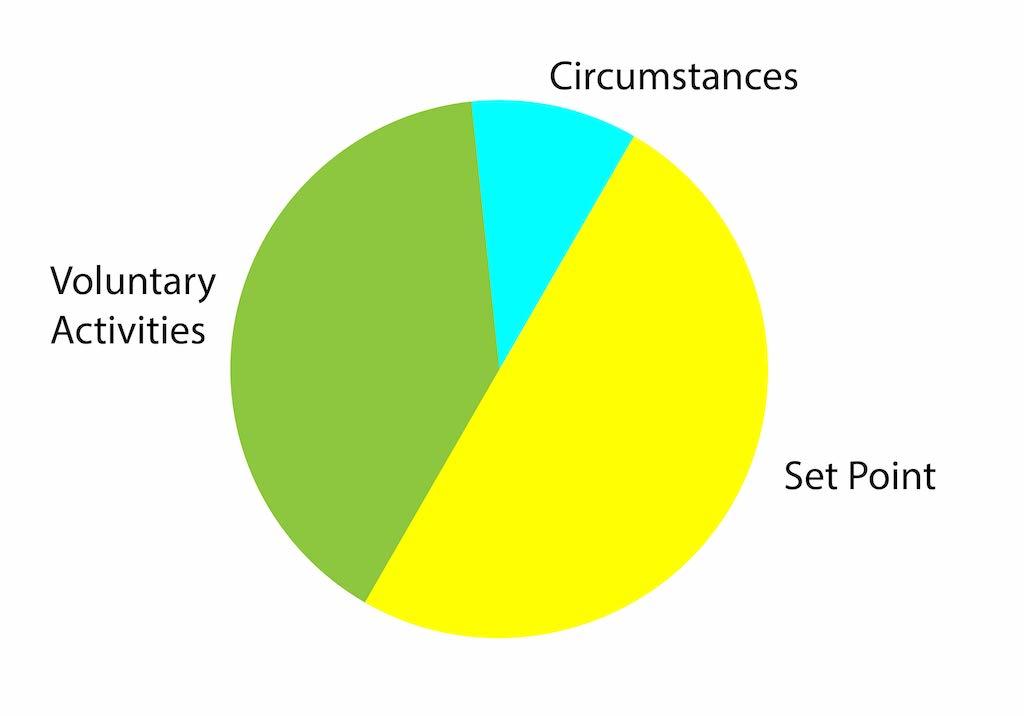
In Part 1, we discussed how being naturally happy or miserable is due in large part to our genes.
Can you control your happiness level?
If naturally happy people can have bouts of depression and naturally unhappy people can have periods of joy, there must be something more to happiness than DNA. Is it nature or nurture that drives our happiness? Are the factors driving your happiness internal or external? As it turns out, it is both.
Starting in the 1990s, several studies have shown the heritability of well-being may be as high as 80%, although the more widely accepted figure is 50%. Psychology Professor Jonathan Haidt likens this to a thermostat, which is set forever. This “set point” could be dialed into 58 for depressives, for example, and 75 for happier people. So, does this mean we are doomed to be only as happy as our biological set point?
A 2005 study published in the Review of General Psychology offers us hope that we are not doomed to the set point when it comes to our happiness. Researchers Sonja Lyubomirsky, Kennon Sheldon and David Schkade hypothesize that this set point accounts for half of our potential happiness. Our circumstances, such as our marital status, income or where we live contribute another 10%. Voluntary activities, such as exercising regularly, striving for personal goals, learning new skills or simply learning to look at life through a different lens, account for the remaining 40%.
Haidt notes that since 50% of our happiness is determined by our set point, there is an argument to be made that in some cases medication, meditation or other cognitive therapies might be required to lift our spirits. But in many (perhaps most) cases, happiness can be found in the other components of what Haidt calls the happiness formula: H = S + C + V, where “H” is happiness, “S” is the set conditions, “C” is one’s circumstances, and “V” is one’s voluntary activities.
The set conditions, “S,” are the biggest determinant of your happiness; you may indeed be naturally happy or unhappy. But you are not doomed to the fate of your genetic makeup. Changes to the “C” and the “V” can impact your happiness for the better.
Your circumstances include factors you can't change, such as your race, sex and age. But they also include things you have some control over, such as your marital status, your income and where you live. Granted, for the most part, these things are difficult to change.
Voluntary activities are those things you choose to do and thus have a great deal of control over. You can choose to exercise or learn a new skill, for example. As trite as it may sound, you can simply decide to focus on the positive. I find it helpful to straighten out sections of my life and categorize what must happen next to promote overall well-being. “I am doing a good job in the husband compartment; next I need to work on the dad compartment.”
Is Happiness An Emotional Or a Rational Choice?

One of my earliest rules of life is “happiness takes effort.” But I realize that oversimplifies what is a very complicated subject. There are people with such a strong “S” in their happiness equation that therapy is called for. Even short of that, you cannot simply decide to be happy and expect that to happen without effort. It is said that being miserable is the easy choice: It is easier to complain about something than to do something about it. This is the emotional choice. But you can make rational decisions to impact the “C” and “V” in your happiness formula that override your emotional instincts.
I’ve heard this best described as the rider on the elephant. Our emotional side is the elephant, and our rational side is the rider. Perched atop the elephant, the rider holds the reins and seems to be in control. But the rider’s control is precarious because the rider is so small compared to the elephant. If the 6-ton elephant and the 200-lb. rider ever disagree on which way to go, the rider is going to lose. The key to effectively changing the balance is for the elephant and rider to move together.
Haidt uses this metaphor as well. “We were shaped by individual selection to be selfish creatures who struggle for resources, pleasure and prestige, and we were shaped by group selection to be hive creatures who long to lose ourselves in something larger. We are social creatures who need love and attachments, and we are industrious creatures with needs for effectance, able to enter a state of vital engagement with our work. We are the rider and we are the elephant, and our mental health depends on the two working together, each drawing on the others’ strengths.”
Effectance is defined as “having a causal effect.” In terms of our happiness, we need to know that what we are doing matters. As aviators, we need to believe we are doing good for more than just our checking account balance and the “total” number in our flight logs. Without effectance, you will have a difficult time motivating yourself to put in the necessary hours and effort to be a better aviator.
In Part 3, we’ll discuss what is the key to being a happy aviator.
Compartmentalization And Happiness, Part 1: https://aviationweek.com/business-aviation/safety-ops-regulation/compar…





